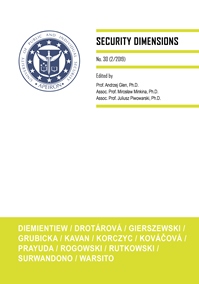State Security Policy and Changing the Nature of the Conflict after the End of the Cold War Rivalry
State Security Policy and Changing the Nature of the Conflict after the End of the Cold War Rivalry
Author(s): Aleksandra KorczycSubject(s): Security and defense
Published by: Wyższa Szkoła Bezpieczeństwa Publicznego i Indywidualnego “Apeiron” w Krakowie
Keywords: new war;Liberia;conflict;Cold War;
Summary/Abstract: The aim of the paper is to try to determine the essence of the new face of armed conflict. Liberia is the main point of reference in the analysis for two reasons. Firstly, Liberia is the oldest independent republic on the African continent and its establishing is linked to paradoxical events begun in 1821, when black people settling in the vicinity of Monrovia, former slaves liberated from South American cotton plantations, reconstructed a slave-like type of society, taking local, poorly organised tribes as their subjects. Secondly, Liberia proves that the intensity of changes in armed conflict does not have to be strictly dependent on the size of the land: a country of small geographical size can equal or even exceed countries with several times larger surface in terms of features of “new wars”. In 1989 in Liberia, the nine-year presidency of Samuel Doe, characterised by exceptional ineptitude and bloody terror, led to the outbreak of clashes between government forces and the opposition from National Patriotic Front of Liberia, led by Charles Taylor. Thus, the first civil war in Liberia was begun, that lasted until 1997 and became an arena of mass violations of human rights, leaving behind 150,000 dead victims and about 850,000 refugees to neighbouring countries.
Journal: Security Dimensions. International and National Studies
- Issue Year: 2019
- Issue No: 30
- Page Range: 22-39
- Page Count: 18
- Language: English

